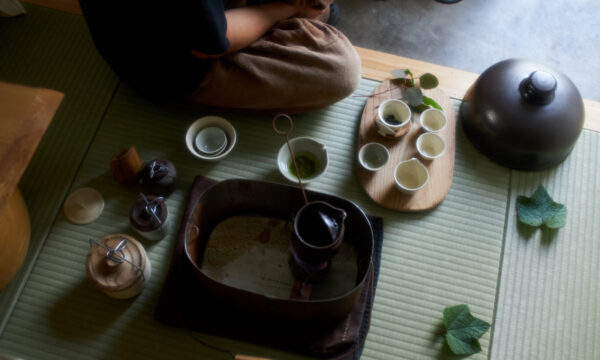
記事の前編はこちらRead Previous Page
Ceramic artisan Takashi Ichikawa’s lessons with tea (1st half)
Takashi Ichikawa is a potter who works out of a studio at the foot of Mount Ibuki in Shiga Prefecture. My firs…
2021.07.13
While working as a potter out of his studio in Yonehara City in Shiga Prefecture, Takashi Ichikawa also has a second identity: that of a tea master who uses his own creations and elements from the various environments in which he finds himself to create once-in-a-lifetime tea experiences. This time, too, he improvises with great aplomb, spreading out his tea utensils and using the leaves and twigs of surrounding plants to create an unforgettable teatime.
Based on the teachings of Chinese gongfu tea, his philosophy is to enjoy the aromas, then savor the changes in flavor as each brew layers on top of the last. In addition to this, he uses his playful spirit to add some new elements, such as, in this case, smoking the tea leaves in a smoker. The tea Ichikawa provides is truly an experience. So what did I learn from this experience, the likes of which cannot easily be savored in everyday life? In this second half of the interview, I try to get to the bottom of that question.
Green tea, pan-fired tea, and wild grass tea are placed in a smoker before being brewed. He also tries a number of different plants as fuel for the smoker – olive, eucalyptus, and raw tea leaves – each of which creates a different aroma in the smoke.
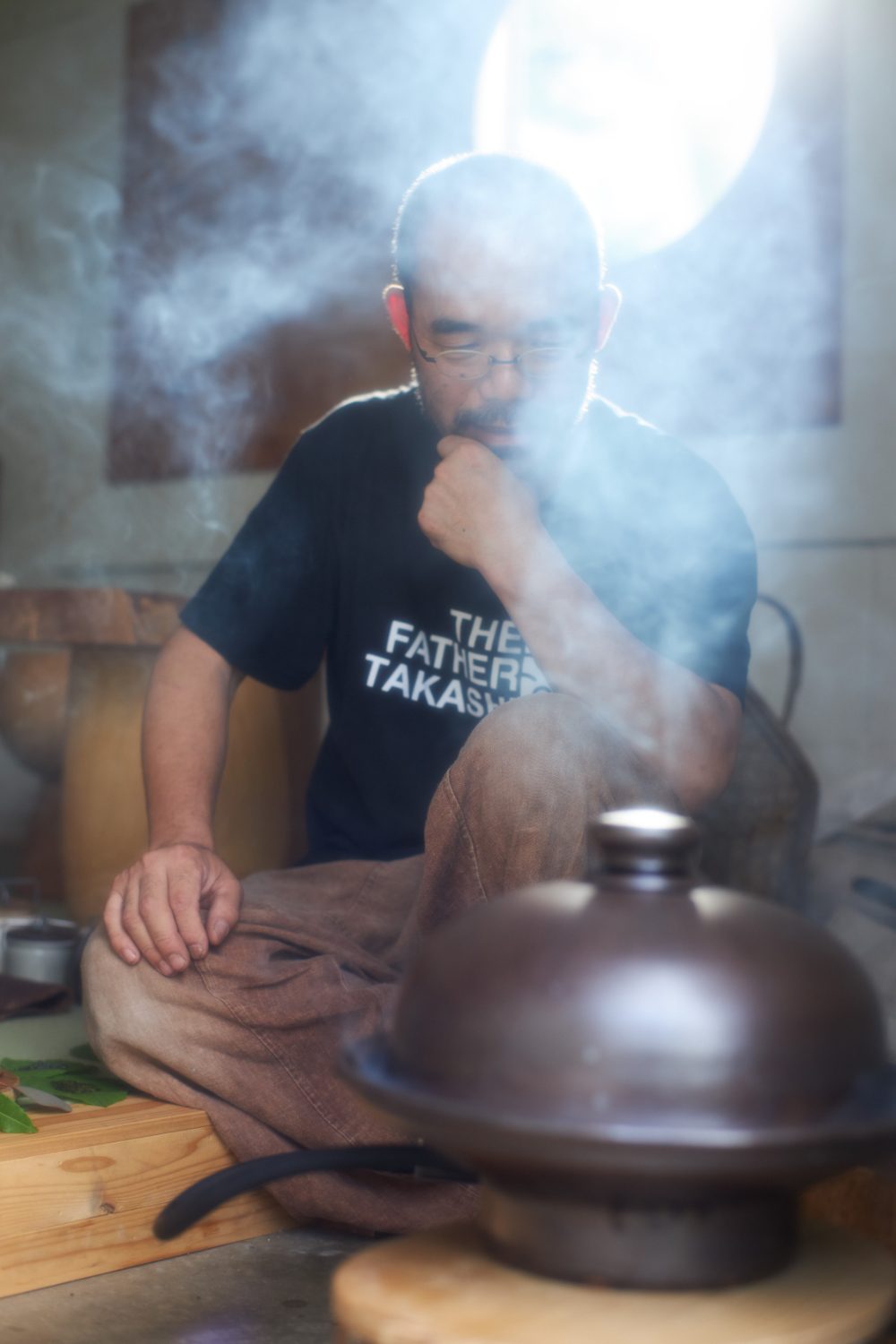
So, does this master of manipulating tea have an unforgettable tea experience of his own?
“I once drank tea in Xishuangbanna in south China (an autonomous prefecture of the Dai people at the southern tip of Yunnan Province). There I came across a huge tea plant said to be 1,000 years old, and had the privilege of tasting tea made using leaves from another ancient specimen between 700 and 800 years old. A young man showed me around, then brewed me a cup of tea in his home whose flavor has always remained in my mind. I remember that pigs and chickens roamed free beneath the house, and there was an old-fashioned open fire pit up on the second floor. I recall how smoky it was, and the tea he made just by putting the leaves in something like a French press, adding hot water, and pouring it into a teacup, was so delicious. I’m sure part of it was that I was so emotionally buoyant, but I remember just how beautiful it was, how pure. I was so excited, having come across such a wonderful tea plant, and I knew how precious the water was to them that he had carefully drawn from the well and boiled. It wasn’t like he used fancy teaware, or anything, but he really did pour his heart and soul into that cup. That scene – it truly was one of the most satisfying feelings I’ve ever felt. That’s why, rather than just trying to do new things for the sake of trying them, I always strive and think about how good I can make people feel with my tea. In other words, I know now that there is value in keeping things simple.”
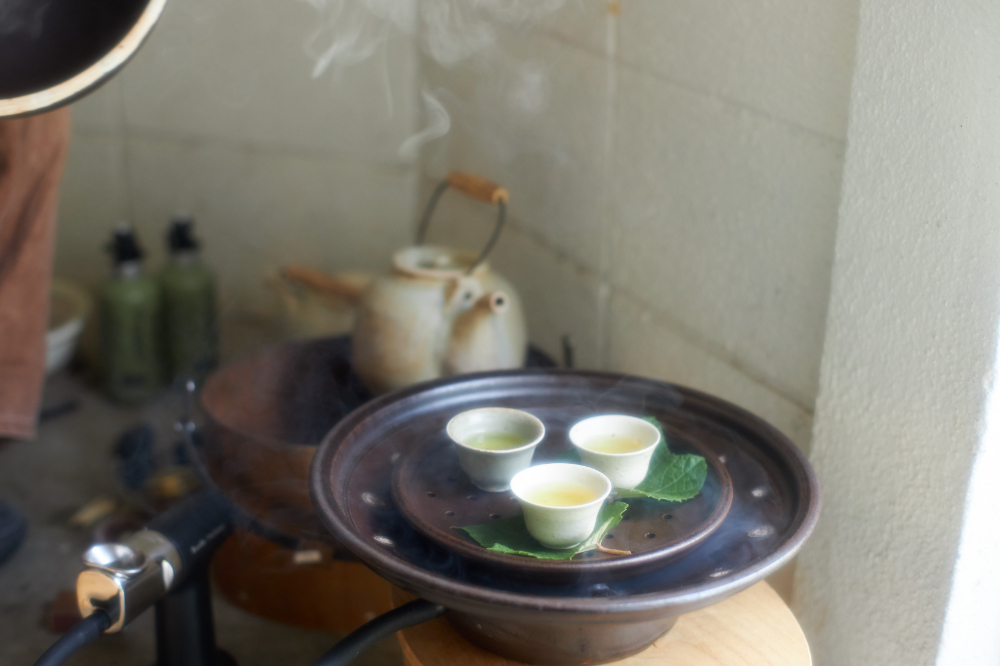
The next cup of tea Ichikawa makes for me combines the used tea leaves from the three brews he has already made. He then places the teacup in the smoker to create a brew fully enshrouded in smoke. I feel like this is his way of sharing with me the memories of that wonderful scene he experienced in Xishuangbanna.
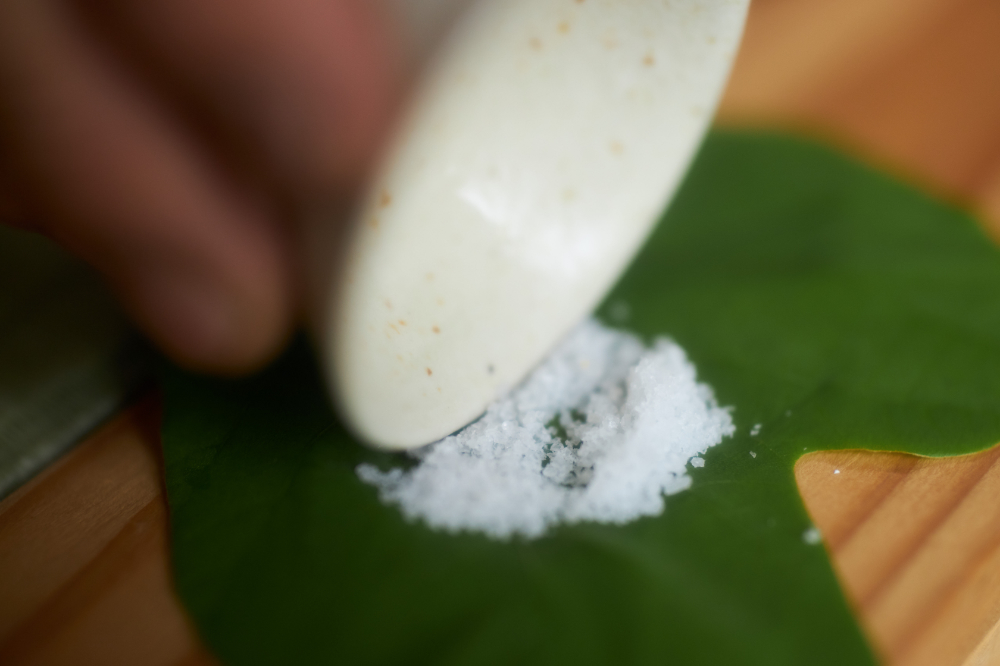
Eventually, it becomes so thick that Ichikawa declares it “basically soup.” A little touch of salt on the lip of the cup creates an exquisite richness that seems to infuse every cell of the body and engenders an appreciation for the salt as well as the tea.
“This is a technique they often use in cocktail-making, just like the use of smoke. The thing is, though, I have no idea if this has any beneficial effects on the body at all. I’d actually like someone to tell me.”
This is Ichikawa’s philosophy of enjoying the unknown, or at least focusing on enjoyment and seeing what can be learned after the fact. More than looking to learn something, it’s about thinking as you go.
“Thinking… or perhaps playing, is still the better word. There must have been people long ago who thought about tea, about the event that is tea drinking. And they couldn’t have known the perfect temperature for the water – they would have had to learn by trial and error. Some of them would have heard stories from others, some would have tried to go further and explore the boundaries of what was possible, while others might have tried to defy conventional wisdom. But it’s the experiences each of these people went through that have value.”
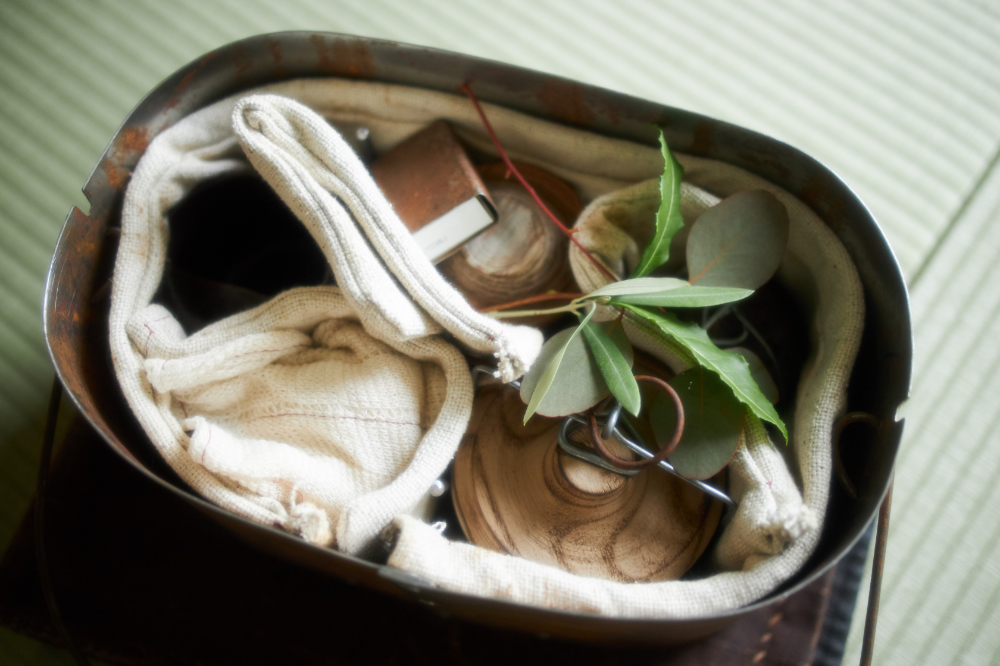
And so draws to a close our little tea party in the entranceway to the tea house. Ichikawa’s teaware – cups, lids, teapots, tea stove – is all tidied away within a single box.
As long as you have a set of teaware, water, and fuel, you can make tea wherever you are. This is the essence of Ichikawa’s famous chaguruma, which allows him to store his teaware, table, and chairs in a single “vehicle,” which he can then take to the fields, up a mountain, or by a river. There are so many types: wheelbarrow-style, backpack-style, easel-style, suitcase-style. And the little tricks he has developed for storing each item are utterly fascinating.
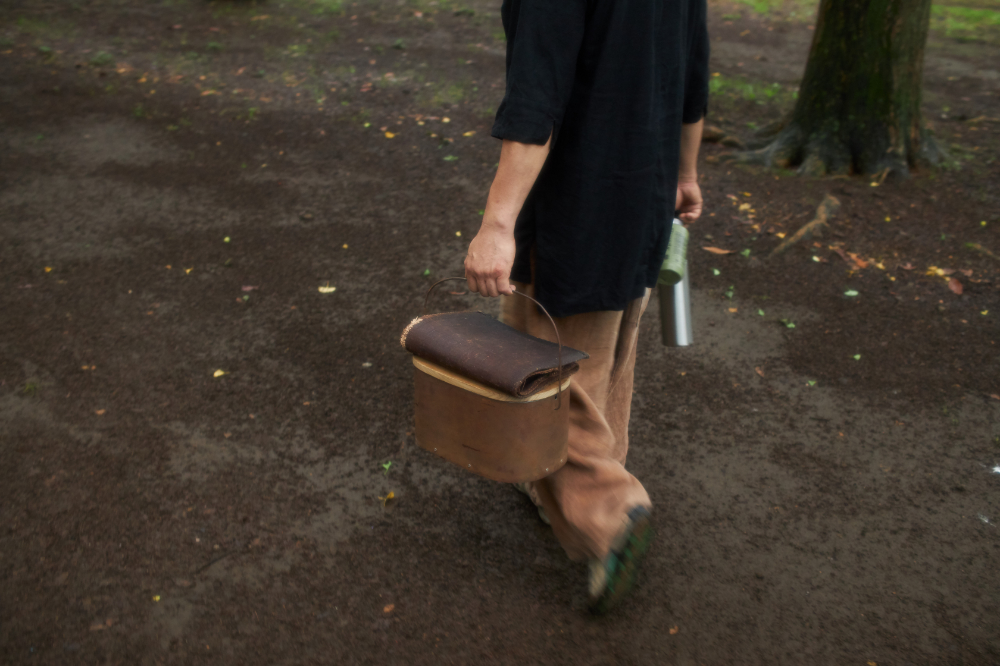
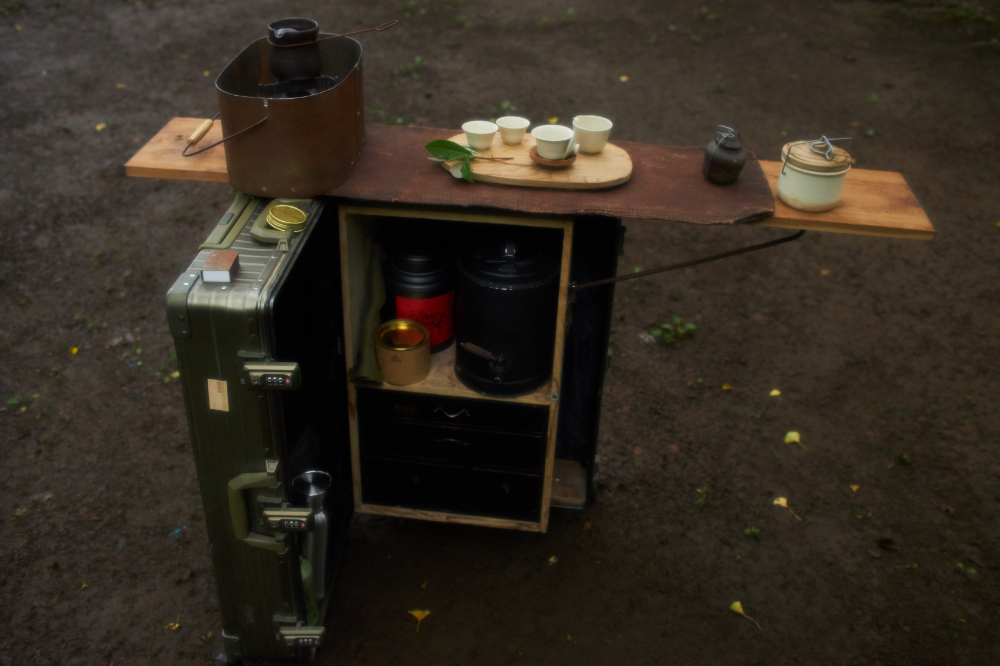
Taking his teaware with him, Ichikawa leads me outside so that we can have one more cup in the beauty of nature. Opening up his chaguruma, he sets up his tea set, then begins to scan his surroundings for leaves and other items he can make use of.
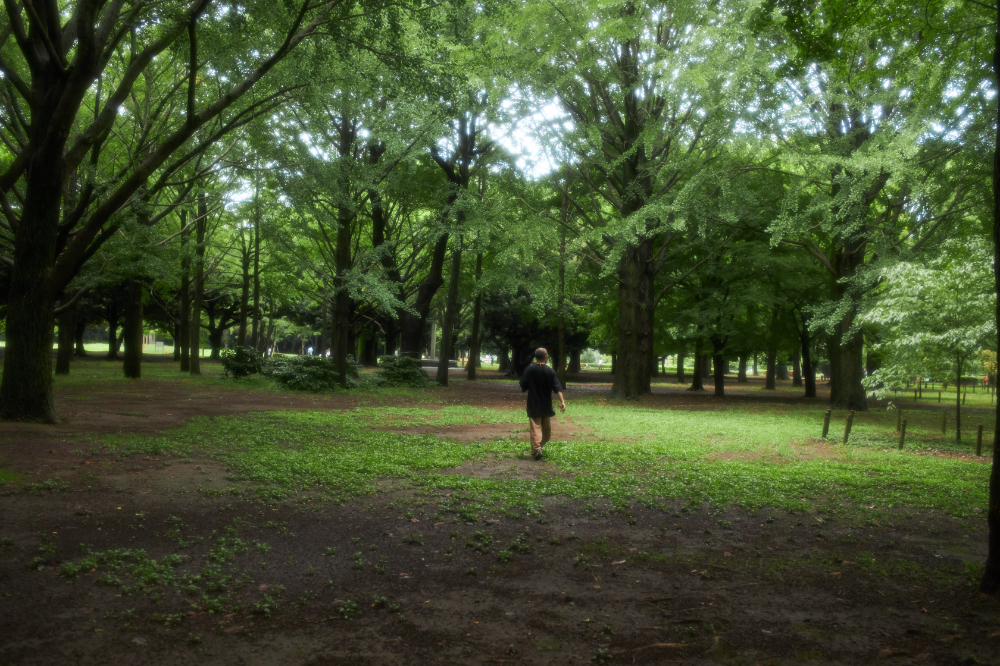
As I suspected, Ichikawa and his wares fit seamlessly into a natural setting. Still feeling a little guilty about having him brew tea for me in the entranceway to the tea house, I also find myself recalling the words he contributed on the occasion of his solo exhibition, “A Reconsideration of Plants,” held recently at Minami-Aoyama’s Center for COSMIC WONDER.
“Now, more than ever, I want to begin from the ground at my feet…
Flowers and shoots, stems and roots. Beans and grains and leaves.
Let us draw strength from plants.
Such beauty and power grow up from the ground at our feet. We just need to flip the switch, and we will see.”
(Taken from the exhibitor’s introduction to “A Reconsideration of Plants”)
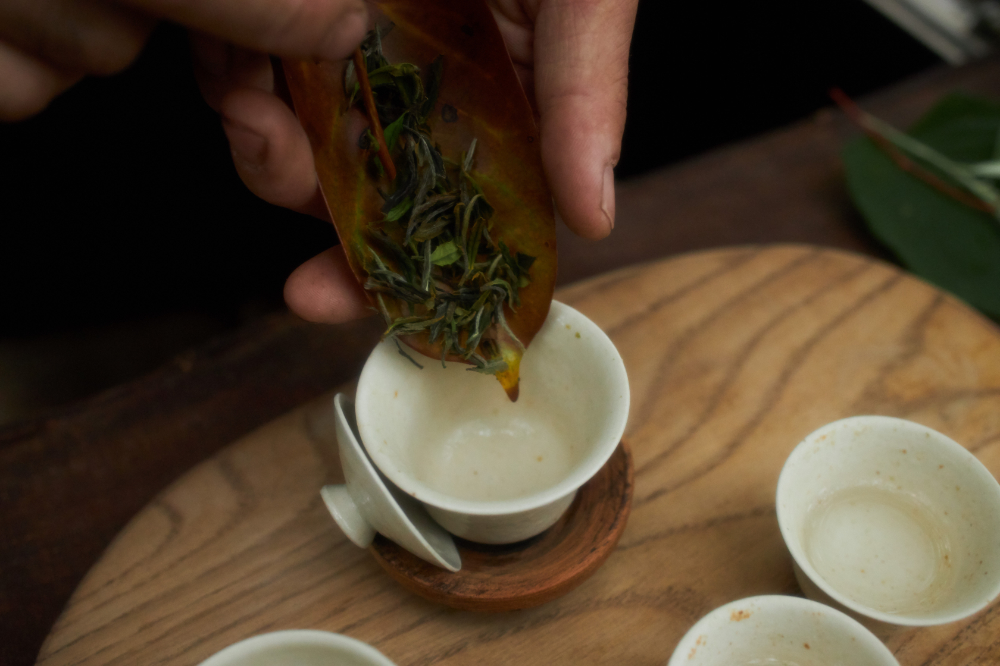
As I sip this final cup of tea, I ask him to explain the meaning behind his words.
“With the COVID pandemic weighing heavily on our lives at the moment, I’m actively searching for ways to boost my body’s immunity. Rather than trying to come up with complex solutions to the problem, I feel like the key is lying right in front of us. For example, you might notice that this white tea makes your body feel loose and energetic. Or other herbs or wild grasses – more than just tasting good, they are filled with the power of nature. I think it’s wonderful that this event has given us a chance to feel our bodies relax like this. We live in a stressful world, and we all have problems, to a greater or larger extent, that cause us vexation. I think plants offer us the gentlest way of counteracting that stress. The best things for our health have always been found in our immediate environment. Take a walk in the woods with someone who knows a lot about wild grasses, and you’ll discover it’s an absolute treasure trove out there.”
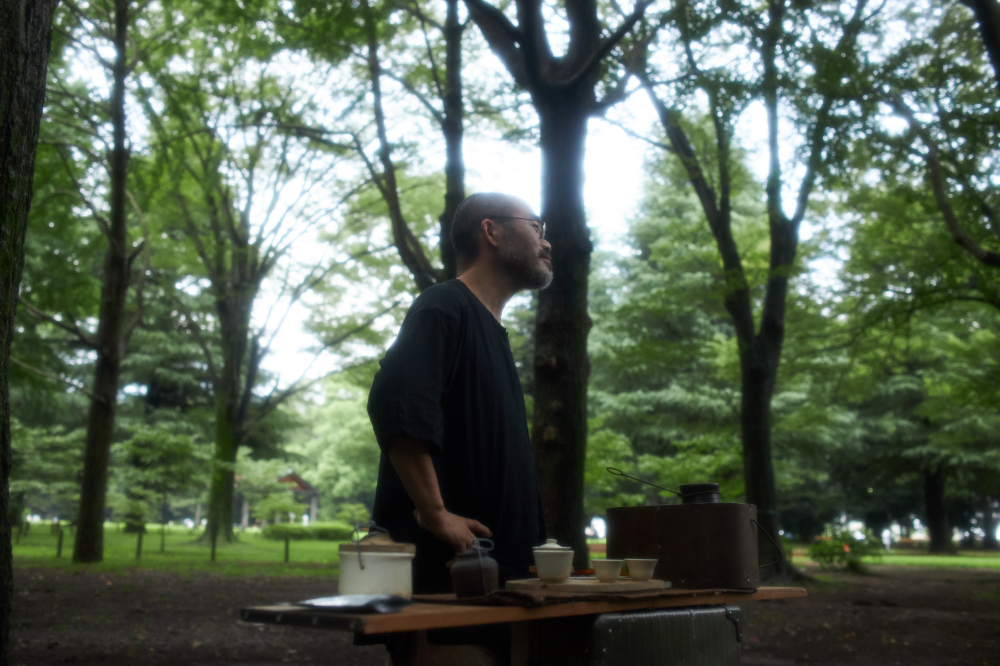
In that respect, tea can be used as a channel that provides a viewpoint to reconsider our relationships with leaves, with water, with fire, and with nature around us. The problem is that our modern lifestyles can make it hard to see that.
By taking tea leaves and smoking them, boiling them, and roasting them, showing us the myriad ways in which the plants growing at our feet can be used creatively, Ichikawa is doing his best to press our internal switch that turns on our appreciation of nature.
“Gather some water, collect some pinecones, and make a fire. All you have to do is combine leaves, fire, and water, and you can create something that changes how you see the world. You may need a little ingenuity, but there’s so much fun to be had.”
Everything he does is light and playful. Perhaps that’s why Ichikawa’s tea has such power to bring true succor to our weary bodies and minds.
Takashi Ichikawa
Born in Shiga Prefecture in 1967. After learning sculpture, he took a job in a pottery, following which he embarked on his own career as a potter. Since building his own kiln in the town of Ibuki, he has held several exhibitions of his wares throughout Japan and overseas. His unique take on tea brewing, drawing inspiration from plants and items in his immediate environment and based on the traditions of Chinese gongfu tea ceremony, has drawn high praise. His latest exhibition begins on August 7th in the Tokinokumo Gallery in Shiga Prefecture.
instagram.com/takashi_ichikawa1212
tokinokumo.com(Takashi Ichikawa Exhibition, August 7th to 15th)
Photo: Yu Inohara (TRON)
Text (originally in Japanese): Yoshiki Tatezaki
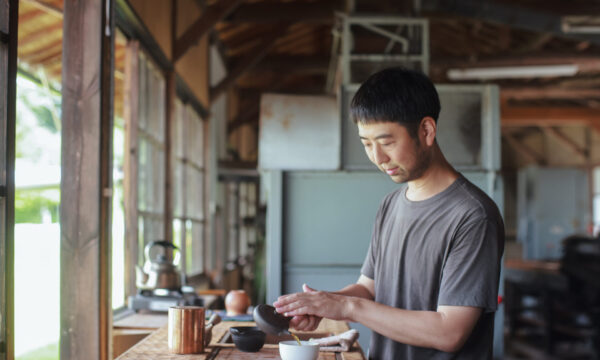
2024.09.20 Tea CraftsmenINTERVIEW
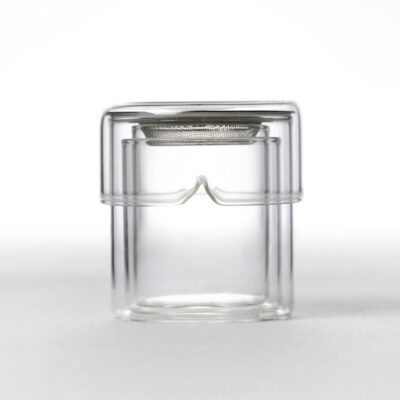
内容:フルセット(グラス3種、急須、茶漉し)
タイプ:茶器

内容:スリーブ×1種(素材 ポリエステル 100%)
タイプ:カスタムツール